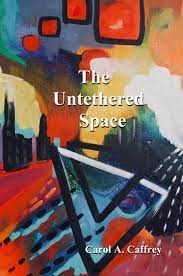The Untethered Space
Carol A. Caffrey
(4Word Press, 2020); pbk £5.99
How does one cope with the enormity of losing all four siblings to cancer? In the preface to Carol A Caffrey’s poignant debut collection, The Untethered Space, she writes, ‘I turned to poetry […] to exhale the heavy burden of grief that weighed on me’. She goes on to extend an invitation, ‘pull up a chair and join me at the table.’ We accept, tentatively, in an expectation that is sure to tether reader and poet as we explore the meaning of grief in all of its guises.
Arranged in six parts under the dynamism of musical terms, a metronome as it were, keeping to the cadence of each section, we are urged to begin at the beginning in ‘da capo al fine’. Here, there is a sense of providence – that which we cannot control as
[…] blindfully we ride along till turned out to the harrowing [.]
The cadence of ‘Allihies Flowers’ flows gently over:
The hills, weathered grey and downy brown
by ancient rock and moss […]
Dishevelled lemons and oranges among the sensible greens portrays ‘peace among the stones that stand above you now’; we sense the pain of grief, not so much in the cemetery where the poet’s siblings lie at rest, but in the gentle assonance and repetition of ‘monbretia’:
gathered from the roadside for your graves. Monbretia. I never knew their
name before; called them Allihies flowers until you told me.
They are keepsakes of that place of high sorrow [.]
The final stanza repeats like waves of grief before conceding acceptance of the inevitable in the final line:
Here’s some monbretia, feilestram dearg,
gathered from the roadside for your graves.
I’ll scatter them for you here and there
until my bones lie down along with yours.
In the sonnet ‘Nocturne’ there is a dissonance between assonance and subject. ‘You and I’ feels accusatory, bleeding the bitterness of loss into the lines as night befalls a relationship:
what will we say, you and I, now the nest
has emptied […]?
The tonal shift in the final line gives pause for thought and a sense of yearning plays out for all that may be lost:
Are we done, do you think, you and I?
The plosive ‘p’ in ‘Post-partum’ increases the tempo, altering the mood as the religious and political landscape are considered. The imagery is post-apocalyptic:
earth itself holds its breath […]
while other patches
of the wasted land shrivelunder smoke and ash.
Caffrey projects the unease of the troubles, cautioning,
take someone’s
measure before we ask:
which way did you vote, then?
‘Cillini’ evokes a visceral reaction to the dark side of religion. Harrowing imagery of the inhumane quickens the pulse and tightens the jaw:
those midnight riders […] must banish
the innocents, pile babies between their mothers’ legs
[…] to become unremembered bones?
The pathos is unshakeable as Caffrey urges,
Let the wind blow softly
through their names. Feather them downinto the grace of remembrance[.]
But she deftly shifts the weight of the focus, balancing the affect in ‘The Stoic’s Revolt’, playfully sharing her ‘heretical thoughts’,
I do rejoice when:
a Protestant gets a pimple […]
I love the smell of schadenfreude in the morning.
We mourn amid the shockwaves of terrorism that ripple from ‘[…] the rubble of Dublin, Easter Nineteen Sixteen’ to the middle-east in ‘The Baghdad Echo’, as a reporter:
remarked they bled the same.
He filed his copy in the rubble […]
Yes despite the dark mysteries of the human condition, Caffrey shares the joy of remembrance despite the grief in the final section, SIMPLICEMENTE, observing in ‘Sandhya Kal’:
[…] in that in-between hour where
we hold our breath as night unrolls
across the earth, the interval where nothing
happens but everything might, that moment where
wakeful mind surrenders to the grace of sleep –then –
you slipped between that sphere and this.
Wanda McGregor


Leave a Reply